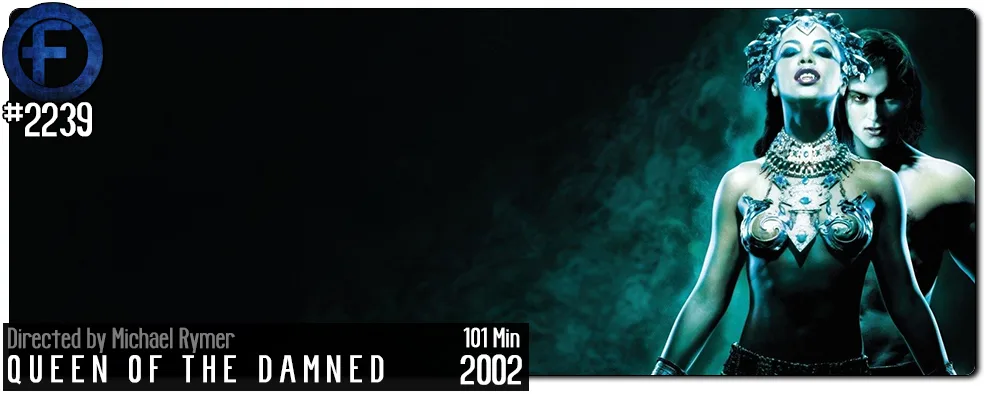Movie Review – Queen of The Damned
Principal Cast : Stewart Townsend, Aaliyah, Marguerite Moreau, Paul McGann, Lena Olin, Christian Manon, Claudia Black, Vincent Perez, Brice Spence, Matthew Newton, Pia Miranda, Tiriel Mora.
Synopsis: In this loose sequel to Interview with the Vampire: The Vampire Chronicles (1994), the vampire Lestat becomes a rock star whose music wakes up the equally beautiful and monstrous queen of all vampires.
********
It’s time to get our fangs out, folks, for today we delve into the cinematic offering known as Queen of the Damned. While we appreciate the production design and Aaliyah’s performance, the rest of this vampiric-themed production lacks… is it a shit way to start a review with the word…bite?
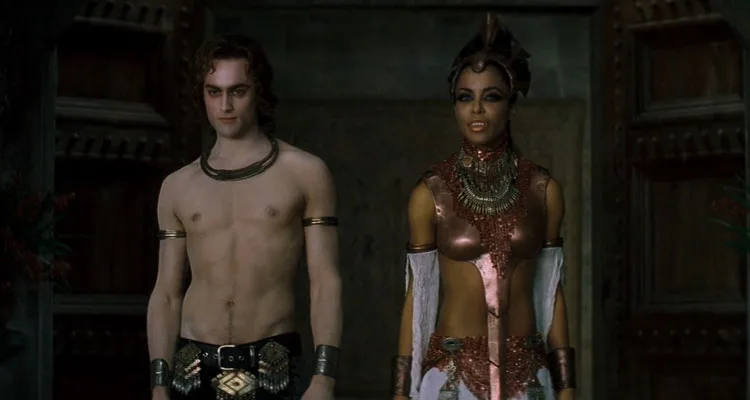
Let’s begin with the positives. The production design in Queen of the Damned stands out as a noteworthy positive aspect. The film’s sets, costumes, and overall visual aesthetic are laudable. The dark, Gothic world created by the production team effectively captures the essence of Anne Rice’s vampire universe. From intricately detailed vampire lairs to the opulent, sinister concert scenes, the production team’s dedication to creating a dark and seductive atmosphere is commendable. It’s a visual treat, dripping with atmosphere and capturing the essence of Anne Rice’s vampire universe.
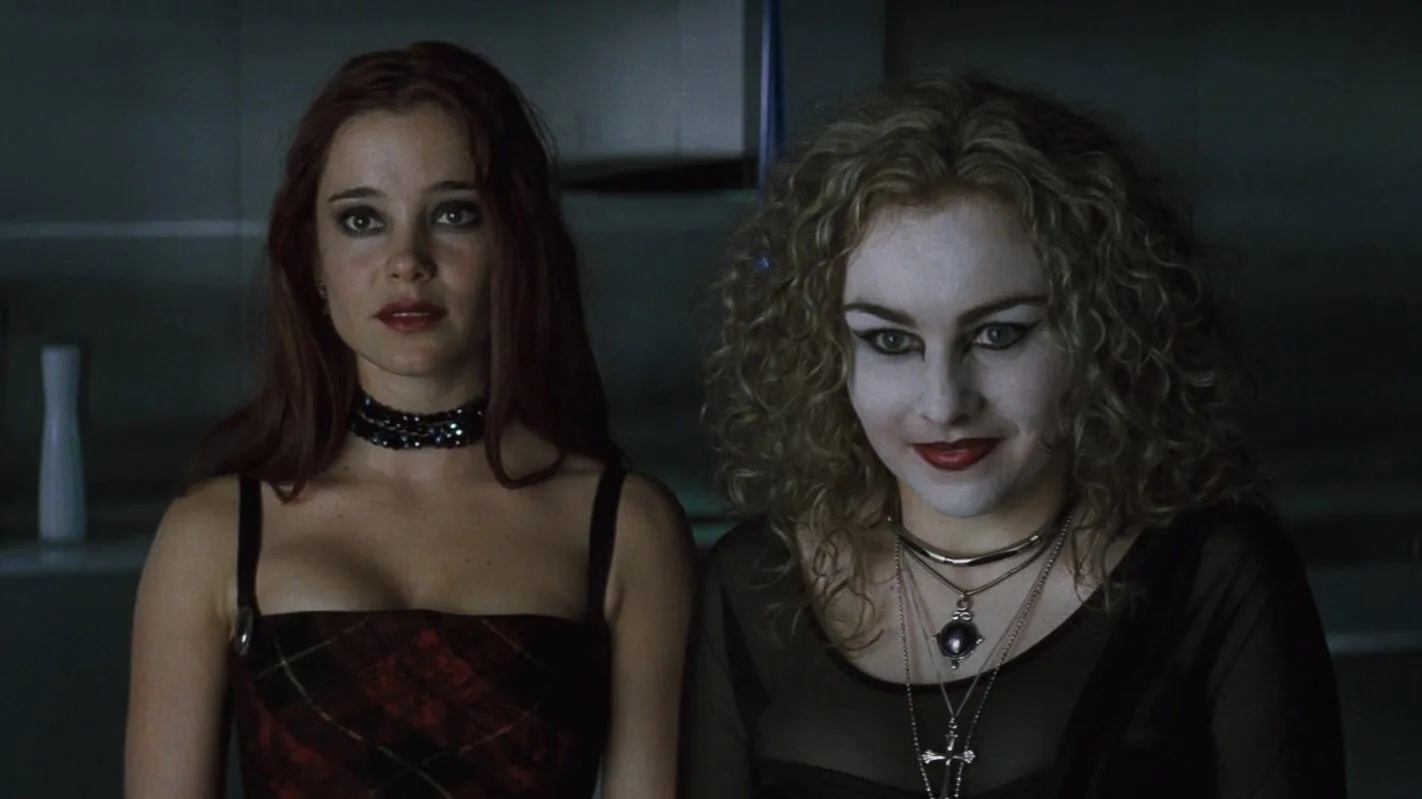
Aaliyah’s performance as Akasha, the titular “Queen of the Damned,” also deserves praise. Her portrayal exudes an air of regal allure befitting the character. Aaliyah’s charisma and presence elevate her scenes above the film’s general quality. It is apparent that she dedicated herself to the role, and her contribution to the film is commendable. She brings depth and mystique to the character of Akasha, embodying the ancient and powerful vampire queen with an impressive mix of grace and menace. However, these positive elements are overshadowed by the film’s significant flaws.
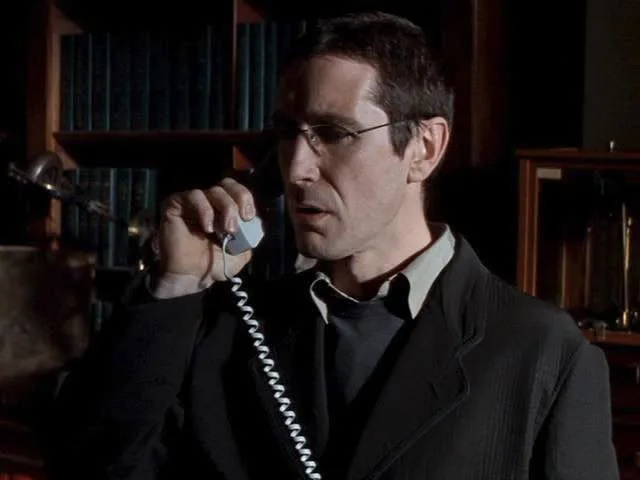
Stuart Townsend’s portrayal of Lestat, the iconic vampire, falls short of expectations. While he may have the appearance, his performance lacks the charisma, complexity, and moral ambiguity inherent to the character. Lestat, in Anne Rice’s novels, is a complex character, filled with charisma, cunning, and a certain moral ambiguity. Townsend’s portrayal lacks all of these essential qualities. He comes across as a brooding, moping emo vampire rather than the charming, charismatic anti-hero he’s meant to be. It’s a significant deviation from the source material. The chemistry between Townsend and Aaliyah is lacking, resulting in forced and awkward interactions. This lack of chemistry is particularly evident in scenes that should be filled with sensuality and tension. It’s a colossal missed opportunity to explore one of the most intriguing relationships in the vampire genre. Lestat and Akasha’s dynamic should be electric, but instead, it’s as dull as a wooden stake.
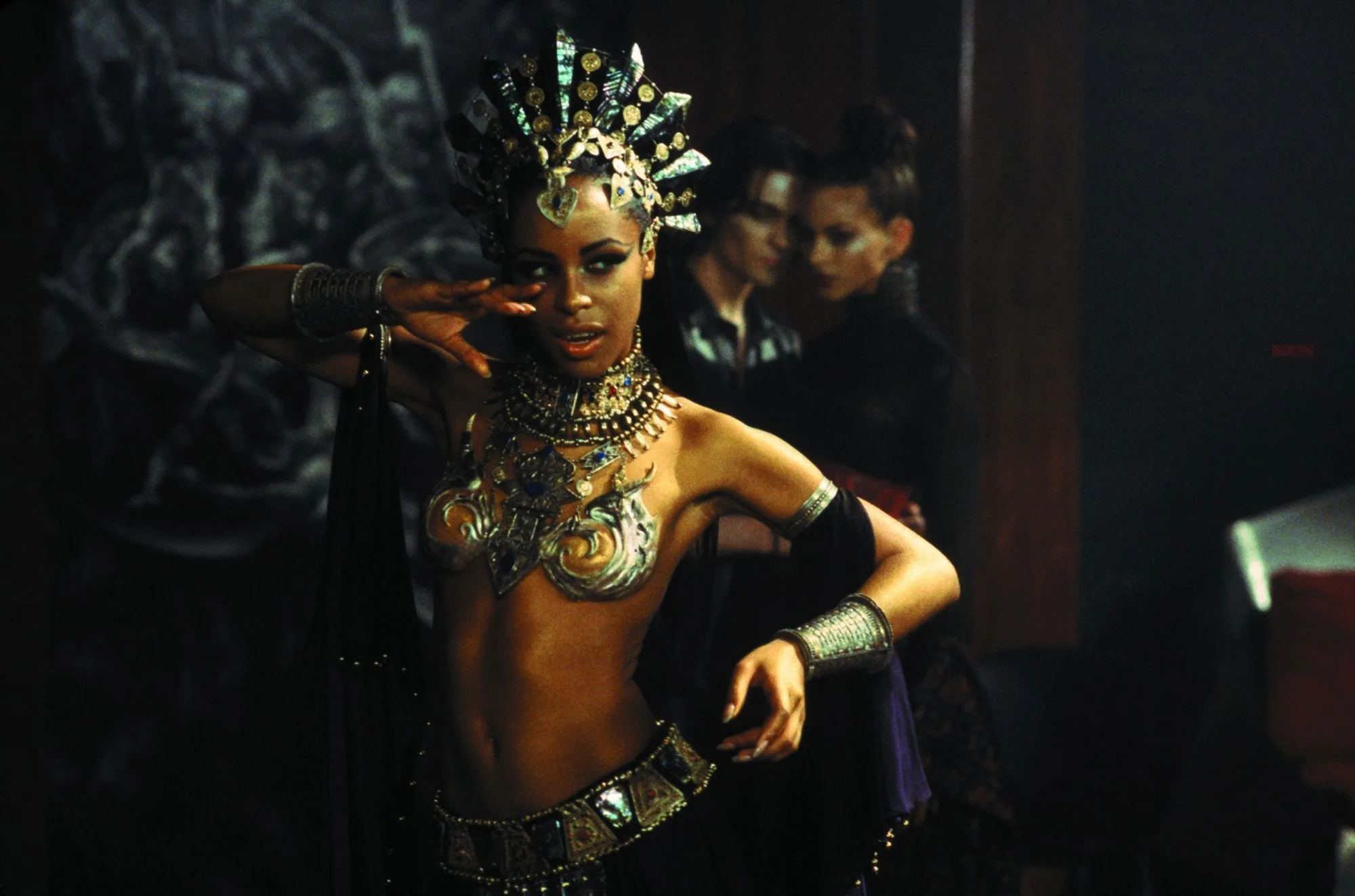
The film’s screenplay is another glaring issue. Queen of the Damned attempts to combine two of Anne Rice’s novels into one movie, resulting in an incoherent and rushed narrative. The film rushes through crucial character development and narrative exposition, leaving you to wonder who these characters are and why you should care about them. It’s a crime to see the rich source material butchered in such a way. The script reduces potentially complex characters to mere caricatures, leaving no room for depth or nuance. The film fails to adequately explore the origins and backgrounds of the key characters, leaving them underdeveloped and often confusing. One of these characters is the Talamascan researcher, Jesse, played by Marguerite Moreau. Her character is supposed to be a Talamascan researcher, but she comes off as nothing more than a convenient plot device. The film desperately tries to inject a sense of mystery by making her the descendant of the original Talamascan society. Still, it’s clumsily executed and never really pays off in any meaningful way. Jesse’s character arc remains underdeveloped and unsatisfying.
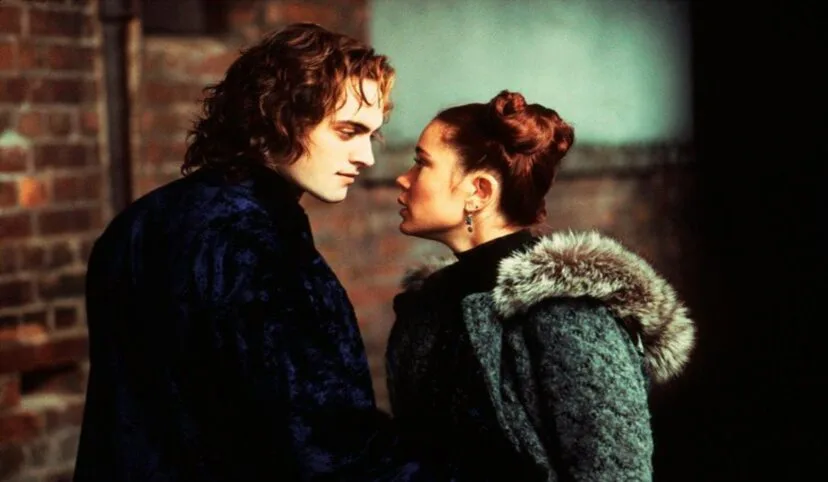
The film’s dialogue is cringe-inducing, filled with melodramatic and eye-roll-inducing lines. Lines like, “The world is my stage, this night is my canvas,” would make even the most dedicated vampire enthusiast cringe in agony. It’s like the scriptwriters were trying to outdo each other in creating the most melodramatic, unintentionally hilarious lines possible. The dialogue lacks subtlety and often descends into over-the-top theatrics. The romantic subplot between Lestat and Jesse is equally uninspiring. There’s no real chemistry between the two, and their whirlwind romance is about as believable as a vampire sparkling in the daylight. It feels rushed, forced, and devoid of any genuine emotion. You’re left wondering why these characters are even drawn to each other in the first place.
The action sequences are also a disappointment. If you’re expecting heart-pounding, well-choreographed vampire battles, you’re in for a letdown. The action scenes are chaotic, poorly lit, and often difficult to follow. It’s a jumble of quick cuts and shaky cam, leaving you disoriented and detached from the supposed tension and danger. The action sequences lack the necessary clarity and intensity to engage the audience. Director Michael Rymer’s direction does little to salvage this sinking ship. Queen of the Damned had so much potential to be a worthy adaptation of Anne Rice’s novels, but Rymer’s vision falls short. It lacks the gravitas and depth that this material demands. Instead, the film feels like a shallow, glossy, and music video-style interpretation of a rich and darkly romantic world.
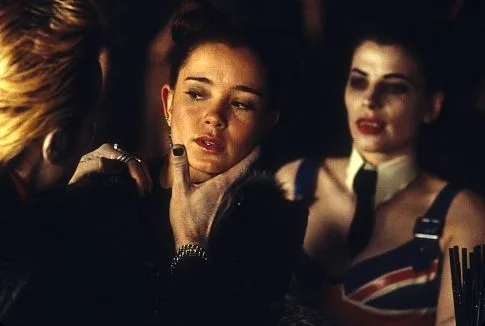
The decision to place so much emphasis on the concert scenes, where Lestat fronts a rock band, is questionable at best. These moments, while visually impressive, serve as distractions from the actual story and characters. Instead of immersing us in the intricacies of vampiric politics and the complexities of the characters, we get endless montages of Lestat belting out angsty rock tunes. The film’s direction fails to capture the depth and complexity of Anne Rice’s vampire world.
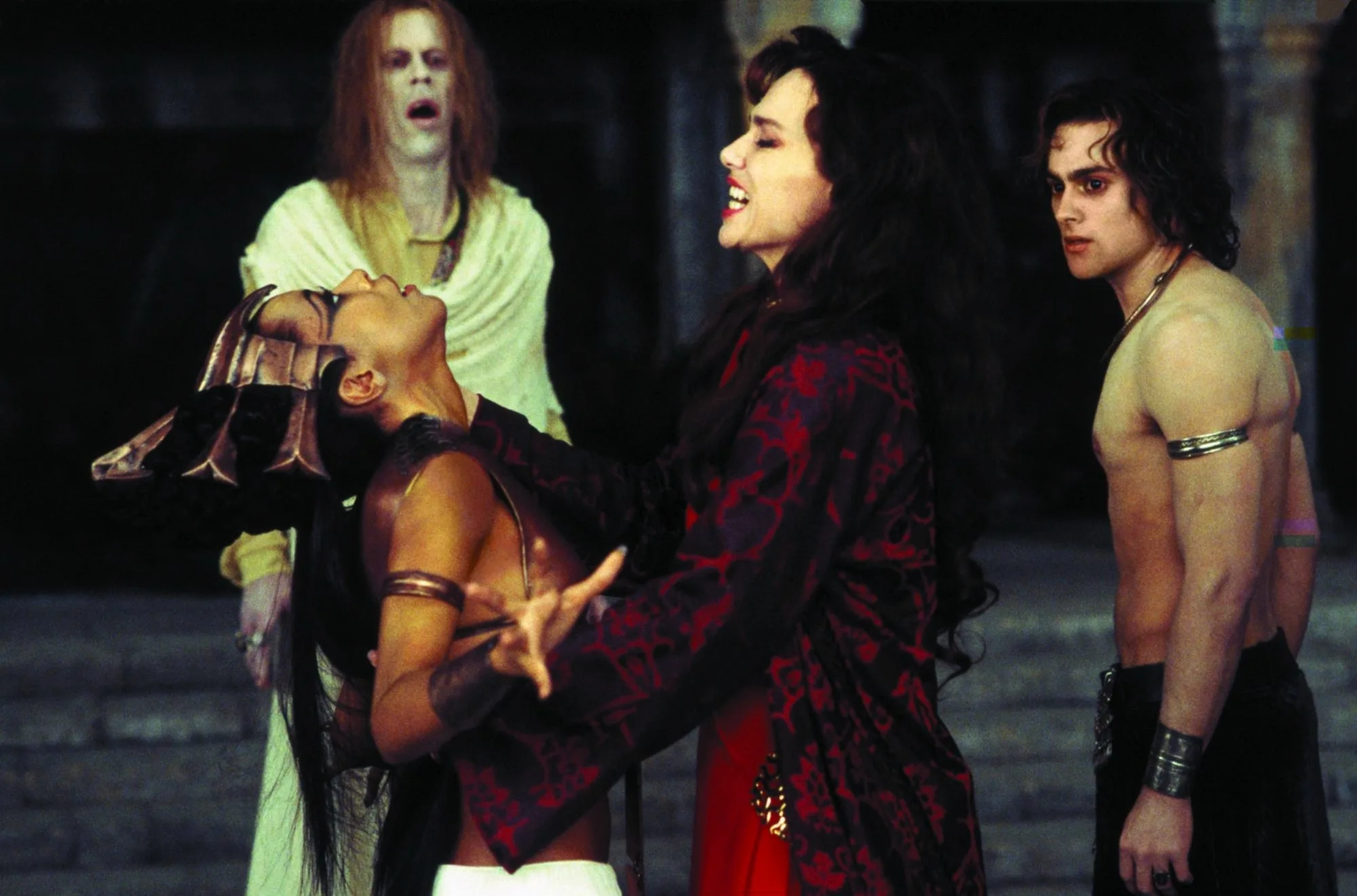
Queen of the Damned is a bloodless attempt to bring Anne Rice’s intricate and alluring vampire universe to the big screen. It squanders the potential of its source material and leaves fans of the novels in a state of eternal disappointment. While the production design and Aaliyah’s performance are praiseworthy, they’re mere drops of quality in a vast sea of mediocrity. The film, like a vampire’s bite, leaves you feeling drained, unsatisfied, and longing for something more substantial. It’s a testament to how a promising concept can be reduced to a laughable, incoherent mess with a poor script, uninspired direction, and underwhelming performances. In the end, Queen of the Damned is a dark stain on the legacy of Anne Rice’s beloved vampire chronicles. If you’re a fan of the novels, prepare to be disappointed. If you’re a fan of good cinema, steer clear. There are far better vampire tales out there deserving of your attention.

